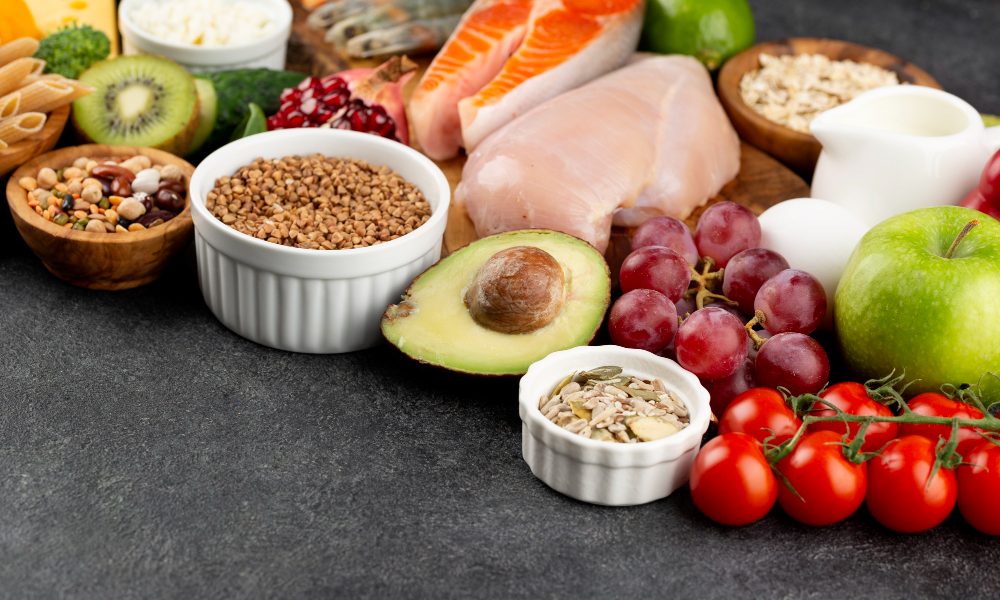
Prediabetic Foods That Can Lower Your Blood Sugar in 2024

Prediabetes is a health condition characterized by blood sugar levels that are higher than normal but not high enough to be classified as type 2 diabetes. Effective diet management can be crucial in controlling and potentially reversing this condition. This article will explore prediabetic foods that can help maintain and lower blood sugar levels.
What Are Prediabetic Foods?

Franck | Pexels | Individuals with prediabetes need to focus on a balanced diet rich in fiber, low in refined sugars, and moderate in carbohydrates.
Prediabetic foods generally refer to items that help stabilize blood sugar levels and prevent spikes, which can exacerbate insulin resistance. Individuals with prediabetes need to focus on a balanced diet rich in fiber, low in refined sugars, and moderate in carbohydrates. These dietary choices aid in blood sugar management, contribute to overall better health and can delay or prevent the onset of type 2 diabetes.
1. Fiber-Rich Foods
One of the most effective strategies for managing prediabetes is increasing your intake of fiber-rich foods. Fiber helps slow the absorption of sugar, assists in maintaining a feeling of fullness, and supports digestive health. Excellent sources of fiber include:
- Beans and legumes
- Fruits and vegetables with edible skins
- Whole grains such as quinoa and barley
- Whole grain breads and cereals

RDNE Stock project | Pexels | Fiber helps slow the absorption of sugar, assists in maintaining a feeling of fullness, and supports digestive health.
2. Carbohydrates
Carbohydrates have a significant impact on blood sugar levels. To manage prediabetes effectively, choosing carbs with a low glycemic index (GI) is crucial, meaning they have a slower, smaller effect on your blood sugar. Foods like steel cut oats, stone-ground whole wheat bread, and non-starchy vegetables like carrots and greens are excellent choices. How you prepare and combine foods can also affect their GI—combining high GI foods with protein or healthy fats can help mitigate blood sugar spikes.
4. Opt for Lean Proteins
Lean protein sources do not affect blood sugar levels like carbohydrates, making them an essential component of a prediabetes diet. Options include:
- Poultry like chicken or turkey (skin removed after cooking)
- Fish such as cod, tuna, and trout
- Plant-based proteins like beans, lentils, tofu, and tempeh
These proteins provide essential nutrients without the added risk of raising blood sugar levels.
Tips to Manage Blood Sugar Levels
Control Food Portion Sizes
Even healthy foods can cause blood sugar levels to rise if consumed in large quantities. Paying attention to portion sizes is essential, especially when eating carbohydrates. Using nutrition labels to understand serving sizes can guide you in making better choices. For instance, a portion of cooked pasta should be about the size of a tennis ball.
Moderation in Alcohol Consumption
Alcohol can have a direct impact on blood sugar levels and overall health. For those with prediabetes, it is advisable to consume alcohol in moderation, if at all. Opt for simple drinks and avoid mixers high in sugar. Also, ensure you stay hydrated by drinking plenty of water alongside alcoholic beverages.
Stay Hydrated
Drinking adequate amounts of water is vital for overall health and can help manage blood sugar levels. Water does not contain carbohydrates or calories, making it the best choice for staying hydrated without affecting blood sugar levels. Monitoring your hydration status by checking the color of your urine can be a practical approach; a pale yellow color indicates good hydration.

Freepik | Drinking adequate amounts of water is vital for overall health and can help manage blood sugar levels.
Exercise Regularly
Regular physical activity is critical in managing prediabetes. Coupled with diet, exercise helps lower blood sugar by making the body more sensitive to insulin and using up glucose as energy. To maximize the benefits, aim for a mix of aerobic and resistance training activities.
Each of these strategies plays a vital role in managing prediabetes. By incorporating prediabetic foods into your diet and adhering to these healthy lifestyle habits, you can significantly improve your blood sugar control and reduce the risk of developing type 2 diabetes. Remember, it’s not about eliminating certain foods entirely but about finding the right balance and making informed choices that support your health goals.
More in Nutrition & Weight Loss
-
`
Hair & Makeup Designer Sarah Rubano Talks Turning Mia Goth Into Pearl
Transforming an actor into an unrecognizable character is no small feat, and Mia Goth’s Pearl makeup in the hit movie “Pearl”...
December 17, 2024 -
`
The Physical Signs of Hunger and How Mindful Eating Makes a Difference
Hunger is one of the most basic yet essential signals our body uses to communicate its need for energy. However, many...
December 15, 2024 -
`
Why Did Chris Pratt Call Anna Faris Before Proposing to Katherine?
Chris Pratt, the beloved star of “Guardians of the Galaxy,” made headlines when he revealed that he called his ex-wife, Anna...
December 3, 2024 -
`
6 Proven Tips to Tackle Insurance Claim Denials Successfully
Claim denials are a common hurdle for healthcare providers and professionals, even for those who follow the necessary procedures to avoid...
December 1, 2024 -
`
5 ‘Bad’ Fitness TikTok Trends You Shouldn’t Follow
TikTok has become a haven for creative fitness advice. But not all trends are worth your time or your health. From...
November 23, 2024 -
`
Does Drinking Water Affect Adrenal Hormones?
Drinking water is often seen as a simple way to stay hydrated, but it has deeper effects on our body than...
November 14, 2024 -
`
Why We Feel the Loss of Celebrities So Deeply?
Celebrity grief might sound strange at first. After all, most of us have never met these famous figures in person, yet...
November 5, 2024 -
`
Are High Deductible Insurance Plans as Ideal as They Appear to Be?
High deductible insurance plans have been a hot topic for years, especially as healthcare costs continue to rise. For many Americans,...
October 31, 2024 -
`
How Training Load Data Can Transform Your Exercise Routine
Tracking progress during workouts is challenging. Simple metrics like mileage or time don’t show the whole picture. Understanding the overall effort...
October 26, 2024















You must be logged in to post a comment Login